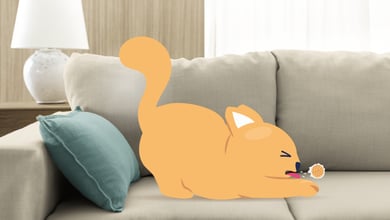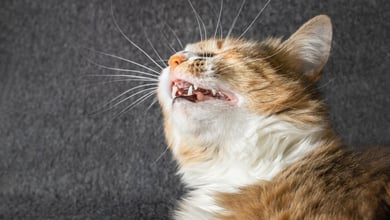Common Causes of Coughing in Cats

Table of Contents
Your cat might be coughing due to common causes such as hairballs, infections, asthma, lung parasites, or a swallowed object. Persistent coughing warrants immediate veterinary attention to diagnose the root cause and establish a suitable treatment plan.
Let's dive into each common cause of coughing in cats:
1. Hairballs
Cats are meticulous groomers and during their grooming sessions, they ingest a lot of their own fur. This swallowed hair can form hairballs in their stomach. When your cat coughs or retches to expel these hairballs, it can sound like a cough.
2. Infections
Viral or bacterial infections like feline herpesvirus or Bordetella can lead to respiratory distress in cats. Symptoms of these infections often include coughing, sneezing, nasal discharge, and sometimes fever.
3. Asthma
Just like humans, cats can suffer from asthma, an inflammatory disease that narrows the airways in the lungs. Exposure to allergens, smoke, or dust can trigger an asthma attack, resulting in coughing, wheezing, and difficulty breathing.
4. Parasites
Certain parasites, such as lungworms, can inhabit a cat's lungs and cause a persistent cough. Cats usually get infected by lungworms through contact with infected rodents, birds, or even slugs and snails.
5. Foreign Bodies
If a cat inhales a small object or piece of food, it can get stuck in their throat or airways. This will often cause them to cough in an attempt to dislodge the object.
It's important to note that persistent coughing is a sign that your cat needs to see a vet. While some coughing is normal, especially in the case of hairballs, repeated coughing episodes warrant a visit to the vet to rule out more serious conditions.
Treatments for Coughing in Cats
The appropriate treatment for a coughing cat will depend on the cause of the cough. Here are some potential treatments and home remedies to treat coughing in cats:
- Regular Grooming: Start with regular grooming to reduce the amount of hair your cat swallows.
- Hairball Remedies: Give your cat a hairball remedy which can break down the hairballs in their digestive system.
- Antibiotics: For bacterial infections, a vet might prescribe antibiotics. For viral infections, keep your cat hydrated and comfortable.
- Respiratory Medications: If your cat is suffering from asthma induced coughing, certain medications can reduce inflammation and open up its airways.
- Anti-parasitic Medications: If your cat has lungworms, a vet will likely suggest anti-parasitic medication to reduce the chance of infection.
- Emergency Vet Visit: If your cat has swallowed or inhaled something they shouldn't have, it could require a veterinarian to remove it using special tools or in some situations surgery.
Always consult with a vet if your cat is coughing persistently. They can determine the underlying cause and recommend the best treatment plan.
Same-Day In-Home Sick Pet Visits
Don't wait for your pet's condition to worsen. Our mobile veterinarians provide same-day and next-day in-home sick pet visits. Schedule now for peace of mind.
When to Seek Veterinary Help
If you notice your cat coughing, it's important to take appropriate steps. Start by closely monitoring their behavior and noting the frequency, duration, and intensity of the cough. Pay attention to any potential triggers, such as meals or exercise.
Additionally, check for other symptoms like wheezing, heavy breathing, or changes in appetite or behavior, as these can provide important information for your veterinarian.
If the coughing persists, is severe, or is accompanied by other concerning symptoms, it's advisable to contact your vet. They may recommend a physical examination or further testing to determine the underlying cause of the cough.
Frequently Asked Questions
What is the difference between coughing and hairballs?
The difference between coughing and hairballs is that coughing in cats involves forceful exhalation with a closed mouth and extended neck, often with a dry sound. Meanwhile, a cat expelling a hairball makes retching or vomiting sounds, usually producing a tubular mass of hair.
Is a cat cough serious?
A cough in a cat can be serious, depending on its cause. Occasional coughs might not be concerning, but a persistent cough could signify a problem like asthma, infection, or parasites. It can also suggest foreign bodies in the airways, or heart disease in rare cases. Don't ignore a cough that is persistent, severe, or associated with other signs of illness such as weight loss, decreased appetite, or difficulty breathing.
Why is my cat coughing after eating wet food?
If your cat starts coughing after eating wet food it could be from eating too fast, food sensitivities, changes in diet, or aspiration (food going "down the wrong pipe"). In some situations it can be from underlying health issues like asthma, heart disease, or even dental problems.






